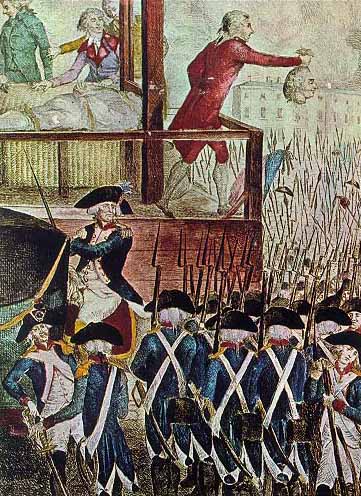Le quatorze juillet

La Prise de la Bastille, Jean-Pierre Houel, 1789
Just a few days back, France commemorated the storming of the Bastille over two centuries ago--an event that, as far as I’m concerned, marked the moral collapse of an otherwise great nation.
Stirring up the mob's hatred of the monarchy and agitated by La Grande Peur, well-known mason Camille Desmoulins stood atop a café table in Paris brandishing a pistol and cried, Citizens, there is no time to lose; the dismissal of Necker [the royal finance minister] is the knell of a Saint Bartholomew for patriots! This very night all the Swiss and German battalions will leave the Champ de Mars to massacre us all; one resource is left—to take arms!
(His mention of "a St. Bartholomew", of course, refers to the St. Bartholomew's Day Massacre two centuries earlier, during which thousands of Huguenots were killed by the French mob. Fault has traditionally been attributed to the Catholics, and particularly the de Medici family, but it makes more sense to blame the ambitious Duke of Anjou and Henri de Guise, who used the popular discontent to their advantage. It also didn’t help that the Hugeunots plastered all of Paris with signs mocking the Eucharist. But more on that another time.)

In any case, the revolutionary mob, fortified by mutinous gardes francaises, attacked the Bastille, not so much to loose the prisoners (a mere seven in number, and politically unimportant) as to amass arms and ammunition. The Marquis de Sade had been transferred from the prison ten days earlier, but the atheist revolutionary had played no small role in persuading the people to attack, using a makeshift megaphone from his cell and daily crying for revolt. After the Bastille's fall, the slaughter started in earnest. Governor De Launay was among the unfortunate fallen: dragged through the streets, kicked, and beaten, he cried out, "Enough! Let me die!" The mob stabbed him again and again, cut off his head and stuck it onto the end of a pike, and paraded it through the streets. By the end of the day, 100 were dead.

A month later, feudalism would be abolished and La Déclaration des droits de l'Homme issued. (The Déclaration was drafted partly by the Marquis de Lafayette, and borrowed heavily from America's own Declaration of Independence and Constitution. In fact, the French government asked Thomas Jefferson to review the document before its acceptance. Come to your own conclusions.). As they say, the rest is history. The French tricolore, each shade standing for liberty, equality, and brotherhood, replaced the old standard of St. Denis, patron saint of Paris. There were mass executions of Catholic priests and religious, the general dechristianization of France, and state-sanctioned worship of secular humanism. France has never quite recovered.

Washington and the Marquis de Lafayette at Valley Forge, John Ward Dunsmore, c. 1909
If only those who had cried out the lyrics of La Marseillaise as they marched into Paris had known they were singing of themselves:
Allons enfants de la patrie,
Le jour de gloire est arrivé
Contre nous de la tyrannie
L'étendard sanglant est levé;
Entendez vous dans les campagnes,
Mugir ces féroces soldats?
Ils viennent jusque dans nos bras
Egorger nos fils, nos compagnes!
Let us go, children of the fatherland,
The day of glory has arrived.
Against us stands tyranny,
The bloody standard is raised;
Do you hear in the countryside
The roar of these savage soldiers?
They come right into our arms
To cut the throats of our sons,
our country.
Aux armes, citoyens!
Formez vos bataillons;
Marchons, marchons!
Qu'un sang impur
Abreuve nos sillons.
To arms, citizens!
Form up your battalions;
Let us march, Let us march!
That their impure blood
Should water our fields.

<< Home